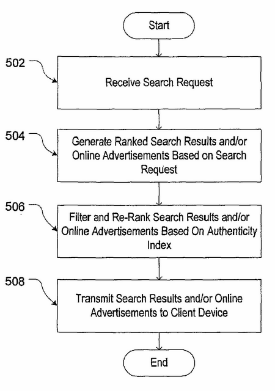A Piracy Free Search Engine from Disney
Many companies and organizations that hold original content are not satisfied by current search engine results. Their premier work is often shadowed on Google by links to advertisements, torrents, or wikipedia entries about the subject. Frustrated with these results, Disney took it upon itself to create a new search engine to promote authenticity of search results and just received a patent for their algorithms.
Disney’s approach to their new search engine is based on an “authenticity index” that first promotes original content and second filters out piracy. To give priority to official sites, their algorithm looks for certain tags that give meaning to a company such as “trademarks, copyrighted material, and domain name information.” Therefore if a user searches for a Disney movie, the official page for the movie should appear above links to IMDB or a wikipedia entry. A simple flow chart of their algorithm is as follows:
Essentially, this algorithm starts off with the something similar to the basic PageRank procedure where related web pages are given some initial valuation 1/k (k being the total number of links) and then iteratively dividing the values along out-links. This process must be repeated until an equilibrium is reached and then the real crux of Disney’s engineer comes into to play where the results of PageRank are filtered and ranked again based on the authenticity of the websites and whether or not they contain certain original content tags (copyright, trademarks,…etc). Finally, this final ranking is returned to the user as an alternative/addition to the original PageRank.
Disney believes that current page rank algorithms that track the popularity of websites based on in-links and out-links fails to “accurately convey the utility of a web page” for a given search entry. This approach can often promote pages that reference disreputable sellers or even pages that can inject malware. It is interesting to discuss the security and piracy aspects of the page rank algorithms discussed in class as more and more malicious content seems to appear on the internet now. On the other hand, Google claims that users who are seeking the obtain pirated information are not using search engines for their content and instead are probably using some P2P networks. Google also addressed, as a business, that it would promote original content on its page rank if it was paid for it.
Currently, it is now known whether or not Disney will actually implement or adopt their patent. A key concern among many critics is that “authenticity” is a very subjective term and it is difficult to judge and compare the original content of certain websites over others.
Sources:
- http://consumerist.com/2014/10/31/disneys-search-engine-patent-lumps-movie-piracy-in-with-child-porn/
- http://torrentfreak.com/disney-patents-piracy-free-search-engine-141029/
